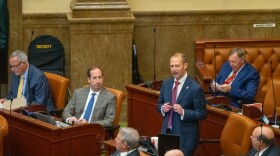-
A repeal referendum driven by a wave of union signature gathering was set to be on the 2026 ballot, but lawmakers decided to just do away with the law for now.
-
The 2018 citizen-approved anti-gerrymandering redistricting law is at the center of Utah’s current mid-decade map battle.
-
El gobernador Spencer Cox dejó pasar la fecha límite del 21 de junio para convocar una elección especial. El referéndum se realizará en las elecciones generales de noviembre de 2026.
-
Gov. Spencer Cox let a June 21 deadline to call a special election pass and instead sent the referendum to the November 2026 general election.
-
With a referendum challenge looking like it will be successful, Lt. Gov. Deidre Henderson put the law on hold while signatures are being counted.
-
As of the morning of April 28, the labor groups hit the 8% target in 15 Senate districts, and 146,480 signatures have been verified.
-
The signatures turned in are more than double the 140,748 needed. The next step is signature verification, followed by 45 days when opponents can convince people to remove their names.
-
Labor groups have until April 15 to gather enough signatures to put Utah’s collective bargaining ban on the ballot.
-
In Utah and elsewhere, lawmakers want to undo voter-approved ballot initiatives or make it harder to pass constitutional amendments.
-
Representatives from eight unions announced Wednesday they intend to file and collect signatures for a ballot statewide referendum to overturn HB267.
-
If you ask some in the Legislature, the 60% voter threshold is about accountability when your neighbor is proposing a tax increase. Similar resolutions failed to pass in the last two years.
-
What is the voter’s place in Utah’s Democracy? It wasn't really an out loud question until the Utah Supreme Court stirred up a hornet's nest over citizen-led ballot initiatives.
Play Live Radio
Next Up:
0:00
0:00
Available On Air Stations










